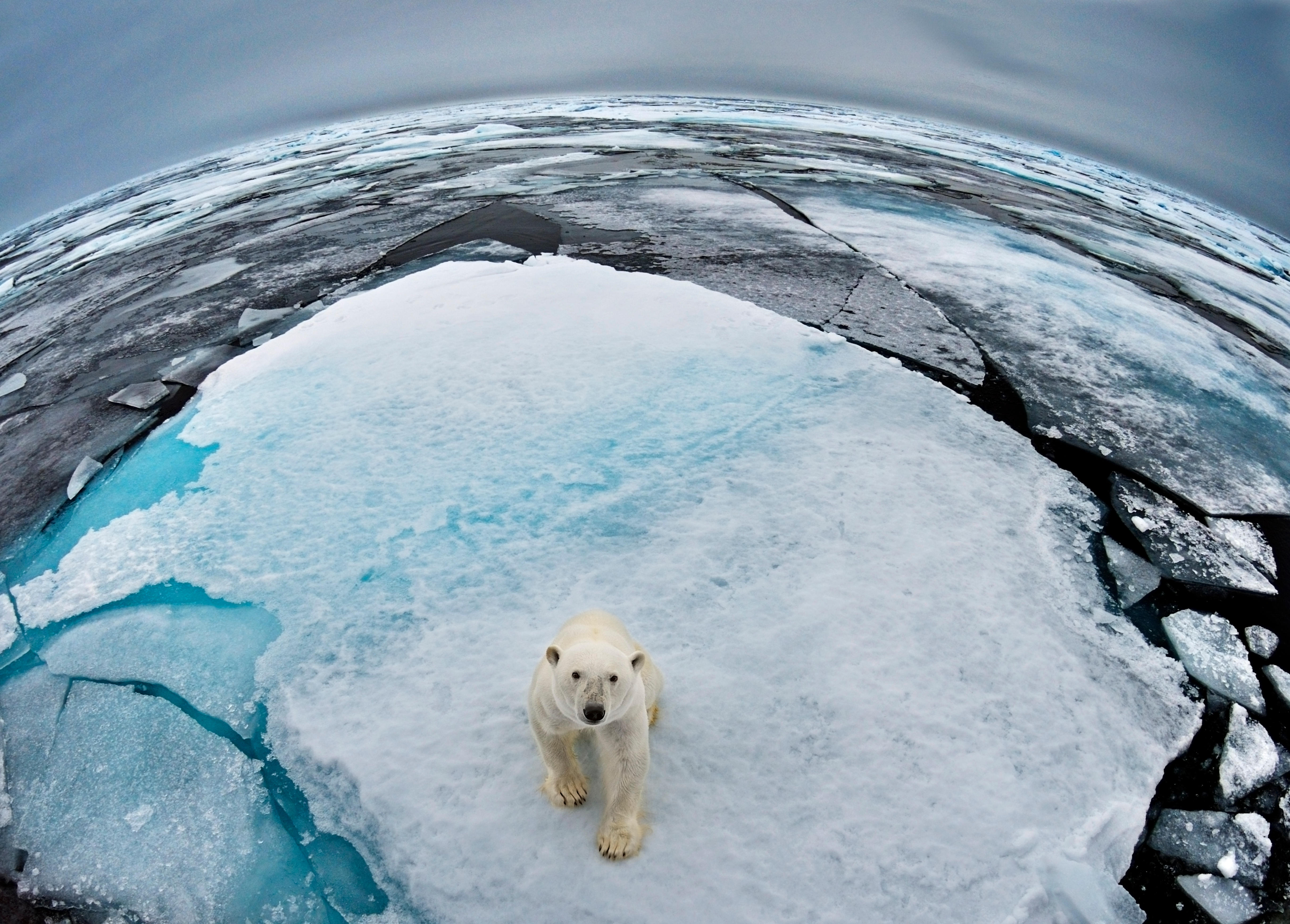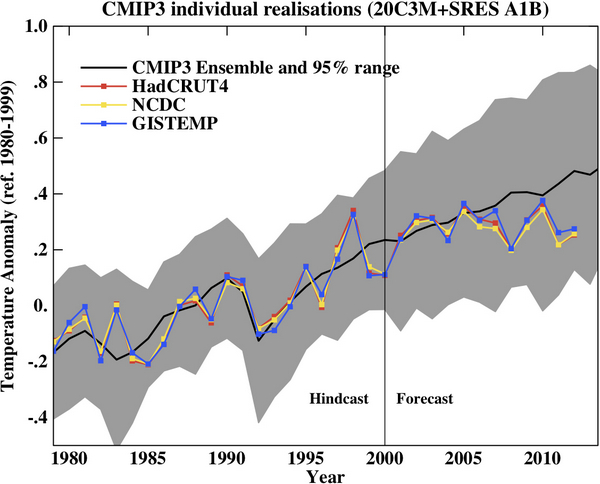Have conservatives noticed their favorite climate talking point has been obliterated?
Remember the global warming "pause?" Funny story...


A free daily email with the biggest news stories of the day – and the best features from TheWeek.com
You are now subscribed
Your newsletter sign-up was successful
Conservatives have long been searching for a reason to do nothing about climate change. For some, this means outright denial of an overwhelming scientific consensus. But that's a bit too kooky for the more cosmopolitan brand of conservative. You can't espouse conspiracy derp and be taken seriously in high society.
Several years ago, it seemed like that crowd had a perfect argument to justify inaction on climate: the global warming "pause." Measurements of global atmospheric temperatures were not quite increasing on the exact path predicted by climate models. Climate science was "troubled," wrote Will Wilkinson. The "warming plateau is...effectively killing the rationale for green policies that limit growth," wrote Walter Russell Mead — hence seeming to justify a policy of "focusing first on areas where the problems in our common life are more immediate," as Ross Douthat put it two years ago.
But lo and behold, two years later warming has surged back with a vengeance. First 2014 was measured as the hottest year on record by a slight margin, then 2015 broke that record by a bit more, and now 2016 is set to obliterate the record again, this time by a huge margin.
The Week
Escape your echo chamber. Get the facts behind the news, plus analysis from multiple perspectives.

Sign up for The Week's Free Newsletters
From our morning news briefing to a weekly Good News Newsletter, get the best of The Week delivered directly to your inbox.
From our morning news briefing to a weekly Good News Newsletter, get the best of The Week delivered directly to your inbox.
Let's set the stage. This chart from 2013 gives a good sense of it. There is an averaged prediction of climate models (the black line, with the gray area representing the margin of error) versus several actual temperature datasets (the blue, red, and yellow lines). If you squint, it seems like the warming trend had slowed quite a bit:

Now, it should be noted that the "pause" was wildly over-hyped even at the time. Atmospheric temperatures are only a tiny fraction of overall warming, since most of the absorbed heat ends up in the ocean. Further data collection made the pause almost vanish. Plus, you should never hang an entire view of a chart on the last few data points. Measurements of complicated systems tend to wander around the trend, so an upward correction was very likely.
Fast forward a couple years, and what do you know, the observed temperature record has sprung back up to square in the middle of the model prediction:
A free daily email with the biggest news stories of the day – and the best features from TheWeek.com
Note that the above chart only includes up to 2015. But 2016 has been so hot that as of May scientists were already calculating that it had a 99 percent chance of breaking the hottest-year-ever record, since it is highly unlikely that the remaining months will be cool enough to drag down the weighted average.
What gives? Well, there's the powerful El Niño which is only just fading out. Most of the heat trapped by increased greenhouse gas concentrations ends up in the ocean. El Niño — an extraordinarily complex series of ocean patterns that brings warmer water to the surface of the Pacific — means some of that heat comes back out, and hence sharply increases atmospheric temperature.
Meanwhile, the negative effects predicted by climate science keep piling up. Coral bleaching has reached epidemic proportions. The Arctic just had its warmest winter on record, and there's a good chance this year will break 2012's record low for sea ice extent. The ocean level has increased 36.5 millimeters since April 2011. Extreme drought and extreme precipitation are happening all over the place.
In his post from 2014, Douthat concluded:
We could be wrong; indeed, we could be badly wrong, in which case we'll deserve to be judged harshly for misplacing priorities in the face of real perils, real threats. But on the evidence available [at] the moment, I'm willing to argue that we have our priorities in order, and the other side's allegedly forward-looking agenda does not. [New York Times]
The evidence is in. He and his ideological cohort were badly wrong. They did misplace their priorities. They did downplay real perils.
But they may yet avoid being judged harshly. Will they come around and admit their previous mistake, and join in advocating for immediate, aggressive climate policy? The world is waiting.
Ryan Cooper is a national correspondent at TheWeek.com. His work has appeared in the Washington Monthly, The New Republic, and the Washington Post.
-
 6 exquisite homes with vast acreage
6 exquisite homes with vast acreageFeature Featuring an off-the-grid contemporary home in New Mexico and lakefront farmhouse in Massachusetts
-
 Film reviews: ‘Wuthering Heights,’ ‘Good Luck, Have Fun, Don’t Die,’ and ‘Sirat’
Film reviews: ‘Wuthering Heights,’ ‘Good Luck, Have Fun, Don’t Die,’ and ‘Sirat’Feature An inconvenient love torments a would-be couple, a gonzo time traveler seeks to save humanity from AI, and a father’s desperate search goes deeply sideways
-
 Political cartoons for February 16
Political cartoons for February 16Cartoons Monday’s political cartoons include President's Day, a valentine from the Epstein files, and more
-
 The billionaires’ wealth tax: a catastrophe for California?
The billionaires’ wealth tax: a catastrophe for California?Talking Point Peter Thiel and Larry Page preparing to change state residency
-
 Bari Weiss’ ‘60 Minutes’ scandal is about more than one report
Bari Weiss’ ‘60 Minutes’ scandal is about more than one reportIN THE SPOTLIGHT By blocking an approved segment on a controversial prison holding US deportees in El Salvador, the editor-in-chief of CBS News has become the main story
-
 Has Zohran Mamdani shown the Democrats how to win again?
Has Zohran Mamdani shown the Democrats how to win again?Today’s Big Question New York City mayoral election touted as victory for left-wing populists but moderate centrist wins elsewhere present more complex path for Democratic Party
-
 Millions turn out for anti-Trump ‘No Kings’ rallies
Millions turn out for anti-Trump ‘No Kings’ ralliesSpeed Read An estimated 7 million people participated, 2 million more than at the first ‘No Kings’ protest in June
-
 Ghislaine Maxwell: angling for a Trump pardon
Ghislaine Maxwell: angling for a Trump pardonTalking Point Convicted sex trafficker's testimony could shed new light on president's links to Jeffrey Epstein
-
 The last words and final moments of 40 presidents
The last words and final moments of 40 presidentsThe Explainer Some are eloquent quotes worthy of the holders of the highest office in the nation, and others... aren't
-
 The JFK files: the truth at last?
The JFK files: the truth at last?In The Spotlight More than 64,000 previously classified documents relating the 1963 assassination of John F. Kennedy have been released by the Trump administration
-
 'Seriously, not literally': how should the world take Donald Trump?
'Seriously, not literally': how should the world take Donald Trump?Today's big question White House rhetoric and reality look likely to become increasingly blurred
